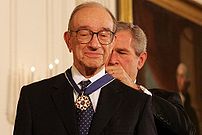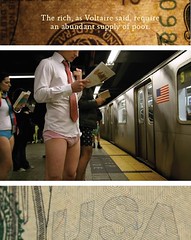
Things aren't going so well on the campaign trail for the Alaskan Governor. According to
CNN:
A McCain source says she appears to be looking out for herself more than the McCain campaign.
"She is a diva. She takes no advice from anyone," said this McCain adviser. "She does not have any relationships of trust with any of us, her family or anyone else.
"Also, she is playing for her own future and sees herself as the next leader of the party. Remember: Divas trust only unto themselves, as they see themselves as the beginning and end of all wisdom."
It get's worse. Another top McCain adviser calls her "a whack job."
Meanwhile after Alaska Senator Ted Stevens was convicted accepting bribes, Palin does her statesman speech, leaving out the most relevant parts.
Alternet.org
Alaska Gov. Sarah Palin issued a statement calling it "a sad day for Alaska." In the statement, Palin also declared that the "verdict shines a light though on the corrupting influence of the big oil service company" whose CEO provided many of Stevens' unreported gifts:Related articles by ZemantaThe verdict shines a light though on the corrupting influence of the big oil service company up there in Alaska that was allowed to control too much of our state. And that control was part of the culture of corruption that I was elected to fight. And that fight must always move forward regardless of party affiliation or seniority or even past service.
Palin's statement neglects to mention that she also has ties to "the big oil service company," Veco. When she ran for lieutenant governor in 2002, "she gathered $5,000 -- or about 10 percent of her campaign fund -- from Veco officials or their wives," including $500 from CEO Bill Allen.
In 2006, when she ran for governor, Palin ran as a critic of Veco and said that she "didn't want Veco money." But her running mate, Sean Parnell, received two $500 checks from Veco officers during the campaign, including one from Allen. Last month, Palin donated to charity "more than $1,000 in campaign contributions from two Alaska politicians implicated" in the federal corruption probe surrounding Veco.
Palin had accepted the donations from the state legislators, John Cowdery and Bruce Weyhrauch, after their offices were searched by the FBI in 2006. Palin made the charitable donations only after the AP had reported that she accepted the money in 2006.

![Reblog this post [with Zemanta]](http://img.zemanta.com/reblog_e.png?x-id=1e6383ed-8993-49aa-9406-a1de3da545f7)







![Reblog this post [with Zemanta]](http://img.zemanta.com/reblog_e.png?x-id=69d6ad0c-b8df-46ce-b69f-ac273931fe27)

![Reblog this post [with Zemanta]](http://img.zemanta.com/reblog_e.png?x-id=d5a934fa-a963-4bf6-b5ed-87599c1ed566)


![Reblog this post [with Zemanta]](http://img.zemanta.com/reblog_e.png?x-id=f1f5362a-7750-4c53-99e4-48777057ca37)

![Reblog this post [with Zemanta]](http://img.zemanta.com/reblog_e.png?x-id=4e5c6054-4f0d-4618-a9e4-b616f2529b10)

![Reblog this post [with Zemanta]](http://img.zemanta.com/reblog_e.png?x-id=eddd3084-4baa-40d1-a08f-f33538061a94)


![Reblog this post [with Zemanta]](http://img.zemanta.com/reblog_e.png?x-id=d164965f-7ef3-44fc-b48d-d0e17a4c01ec)

![Reblog this post [with Zemanta]](http://img.zemanta.com/reblog_e.png?x-id=e8a8c54d-099f-47c6-ae05-e54af80c2324)

![Reblog this post [with Zemanta]](http://img.zemanta.com/reblog_e.png?x-id=14224203-8ddc-4b38-9745-2ea4eb8d4526)
![Reblog this post [with Zemanta]](http://img.zemanta.com/reblog_e.png?x-id=b41dea66-5533-40ab-b22e-5ea9684ebdcb)


![Reblog this post [with Zemanta]](http://img.zemanta.com/reblog_e.png?x-id=57de47cb-25e3-4012-9e83-3553741cfab0)

![Reblog this post [with Zemanta]](http://img.zemanta.com/reblog_e.png?x-id=0e40bb0f-2234-44fd-b590-6dcfb3edfacf)

![Reblog this post [with Zemanta]](http://img.zemanta.com/reblog_e.png?x-id=09089296-b5eb-45a2-a7a4-6e7a4a6553c3)

![Reblog this post [with Zemanta]](http://img.zemanta.com/reblog_e.png?x-id=11579006-4f1e-4f02-a236-1880dc69c4ce)

![Reblog this post [with Zemanta]](http://img.zemanta.com/reblog_e.png?x-id=06573ec3-fbc9-424e-a95b-3f2dec677b5f)


![Reblog this post [with Zemanta]](http://img.zemanta.com/reblog_e.png?x-id=cddcc2eb-13fd-4f05-a573-7a27ebc9da6c)

![Reblog this post [with Zemanta]](http://img.zemanta.com/reblog_e.png?x-id=db651625-3409-4667-ab62-0119bf90f1f8)

![Reblog this post [with Zemanta]](http://img.zemanta.com/reblog_e.png?x-id=bcf0ff5a-9e6b-491b-9d10-534b81645d93)
![Reblog this post [with Zemanta]](http://img.zemanta.com/reblog_e.png?x-id=a1395c8b-c1df-46b8-b44e-759da26f9092)

![Reblog this post [with Zemanta]](http://img.zemanta.com/reblog_e.png?x-id=dc98279b-3ccc-43da-84fb-3cf42ebe4396)

![Reblog this post [with Zemanta]](http://img.zemanta.com/reblog_e.png?x-id=c8ffd839-da6e-430d-9070-4042821d2c9a)
